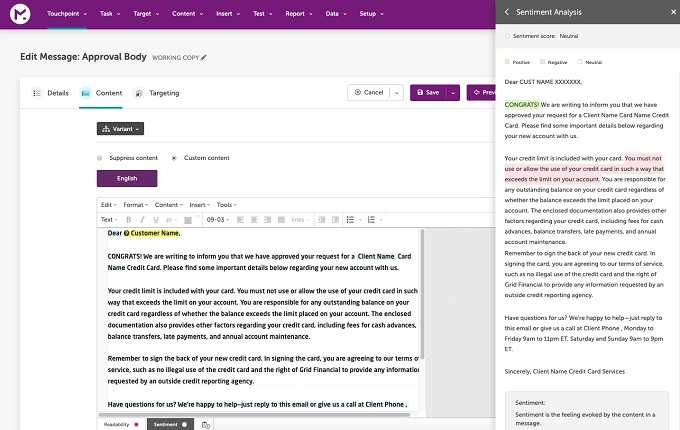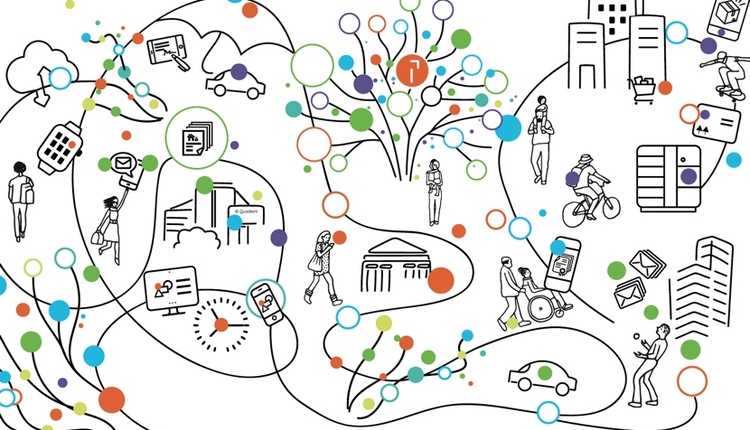
The convergence of artificial intelligence (AI) and machine learning technology with customer communications management (CCM) systems has reached a decisive tipping point, moving from a mere possibility to out-of-the-box products. You don’t have to look far for evidence of this fact. Messagepoint, a long-standing innovator in CCM with a decided focus on enabling non-technical business users, has steadily invested in their AI development for the last three years—work that has culminated in the release of MARCIE, an AI-powered engine that intelligently optimizes, authors, and manages the complex content within customer communications.
Messagepoint officially announced MARCIE at DOCUMENT Strategy Forum (DSF) on May 6, 2019 in Anaheim, CA and generally released their machine learning infrastructure as part of their 19.1 release on May 31, 2019, and updated as part of their 19.2 release on November 30th, 2019. MARCIE builds onto the work they’ve done with Rationalizer since 2016, a tool that leverages AI and machine learning to help migrate, ingest, and optimize legacy content for modern environments.
A key aspect of Rationalizer is the ability to auto-tag individual content objects from various inputs, including print streams, PDF files, Word documents, and from other CCM tools. With MARCIE, machine learning and natural language processing (NLP) techniques are employed to not only identify duplicate and similar objects but to intelligently understand them and then enrich their use. For example, the AI engine applies semantic similarities to help identify similar meaning within content as well as offer recommendations around the actual content itself (like replacing brand elements that are out of compliance or improving readability, sentiment, and quality of communications).

Messagepoint has embedded these AI-powered analytics through reporting dashboards right into the authoring experience of their core CCM platform and migration tool.
While rationalizing large amounts of communication templates and content cleanup pose valuable benefits to the organization, it is the assisted authoring capabilities in MARCIE that offer some of the most interesting advances for CCM professionals. Targeted at creating new content, the AI engine offers proactive suggestions during the creation and editing process to increase reuse of content, consistency, and sentiment across enterprise-wide communications and platforms. In this way, MARCIE can be seen as a centralized hub for CCM that could be leveraged to intelligently supplement information on the consistency of brand alignment and customer experience across all the various stakeholders in the organization. Messagepoint’s AI engine, in effect, surfaces all the necessary information and the analysis around that content, leaving the user to make the ultimate decision on how to write or change the sentence based on the recommendations provided.

Since 1998, the Toronto-based firm has excelled in managing the complicated process of updating and reusing content blocks, template variation, and resolving the underlying business rules directly within the composition engine. While Messagepoint’s cloud-based CCM platform comes with its own composition tool, they are uniquely positioned in the market that this functionality also layers on top of OpenText Exstream and Quadient Inspire composition systems as well as other digital publishing platforms. However, as of late, Messagepoint has been quietly carving out a new area of competitive differentiation for themselves. Fueled by $17 million dollars from a Boston-based growth equity firm in 2016, and a Series B funding round from a Philadelphia-based private equity firm in 2018, they have increasingly focused their strategic direction toward content intelligence.
According to Forrester, content intelligence is defined as “the use of artificial intelligence technologies to understand and capture the qualities inherent in any content—its emotional appeal, subject matter, style, tone, or sentiment, for example.” This approach rapidly delivers machine learning capabilities to more business users than ever before (often referred to as the democratization of technology) to enhance their daily content tasks.
Understanding and optimizing content allows organizations to deliver consistent customer experiences, no matter the channel. However, the most common occurrence for these inconsistencies is often found within complex (i.e., multi-jurisdictional, multi-brand, or multi-line of business) communications. “We believe that combining traditional customer communications with content intelligence helps you to create better content and better content management,” says Patrick Kehoe, Executive Vice President of Product Management at Messagepoint.
Drawing from their rich history in content management and user enablement, Messagepoint has worked to bake in AI functionality into their core platform rather than as a bolt-on accessory. This has been accomplished through their own internal team of researchers and data scientists to build an extensible, scalable AI engine that helps to better manage and improve content. According to Messagepoint, MARCIE uses both supervised (annotated and labeled by an expert) and unsupervised AI (raw data) as the basic building blocks of their tool. The AI engine uses statistical relational learning to understand how this data is distributed and the inherent relationships that connect them in order to more intelligently process this content. According to the University of Texas at Austin, “by combining the power of logic and probability, such systems can perform robust and accurate reasoning and learning about complex relational data.” In this machine learning paradigm, information has an entity-centric view, while data is the product of entity-to-entity interactions.
In 2019, Messagepoint extended the capabilities of MARCIE within their migration tool Rationalizer and within the content library of their SaaS-based CCM platform Messagepoint. While MARCIE comes embedded in their core CCM solution, Rationalizer is an optional module for customers.










